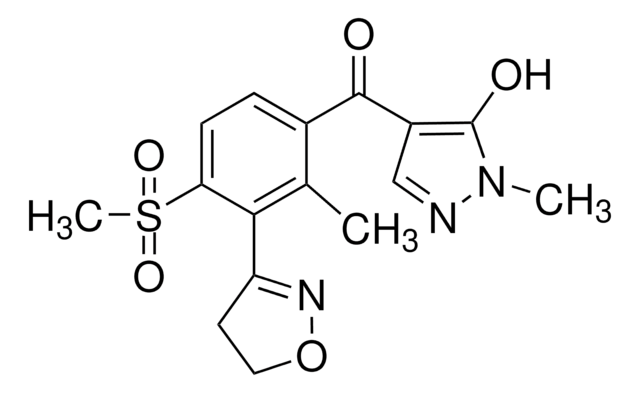32973
Pyrasulfotole
PESTANAL®, analytical standard
Synonym(s):
(5-Hydroxy-1,3-dimethyl-1H-pyrazol-4-yl)[2-(methylsulfonyl)-4-(trifluoromethyl)phenyl]methanone, (5-Hydroxy-1,3-dimethylpyrazol-4-yl)(α,α,α-trifluoro-2-mesyl-p-tolyl)methanone
About This Item
Recommended Products
grade
analytical standard
Quality Level
product line
PESTANAL®
shelf life
limited shelf life, expiry date on the label
technique(s)
HPLC: suitable
gas chromatography (GC): suitable
application(s)
agriculture
environmental
format
neat
SMILES string
Cc1nn(C)c(O)c1C(=O)c2cc(ccc2S(C)(=O)=O)C(F)(F)F
InChI
1S/C14H13F3N2O4S/c1-7-11(13(21)19(2)18-7)12(20)9-5-4-8(14(15,16)17)6-10(9)24(3,22)23/h4-6,21H,1-3H3
InChI key
DWSPRBSLSXQIEJ-UHFFFAOYSA-N
Looking for similar products? Visit Product Comparison Guide
Related Categories
General description
Application
- Agricultural products by liquid chromatography-time of flight mass spectrometry (LC-TOF-MS).
- Vegetables and fruits by LC coupled to tandem mass spectrometry (MS/MS).
Recommended products
Legal Information
Signal Word
Warning
Hazard Statements
Precautionary Statements
Hazard Classifications
Aquatic Acute 1 - Aquatic Chronic 1 - STOT RE 2 Oral
Target Organs
Liver,Urinary system,Pancreas
Storage Class Code
11 - Combustible Solids
WGK
WGK 1
Flash Point(F)
Not applicable
Flash Point(C)
Not applicable
Personal Protective Equipment
Choose from one of the most recent versions:
Already Own This Product?
Find documentation for the products that you have recently purchased in the Document Library.
Our team of scientists has experience in all areas of research including Life Science, Material Science, Chemical Synthesis, Chromatography, Analytical and many others.
Contact Technical Service










